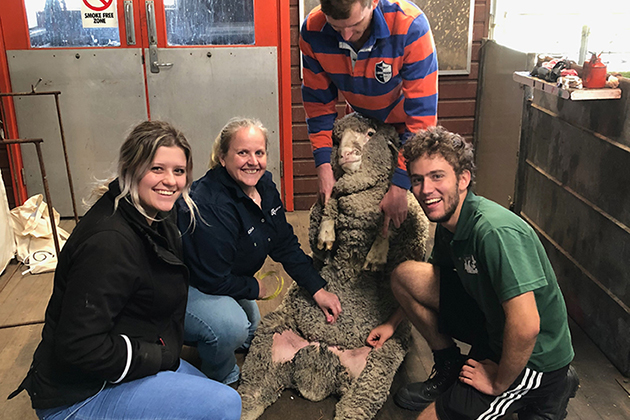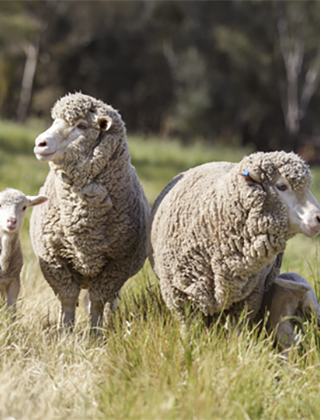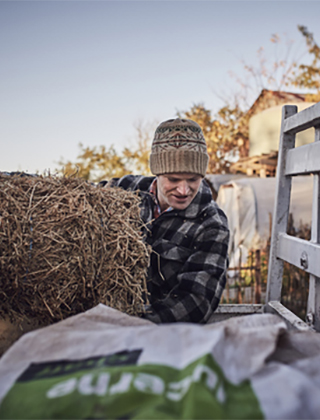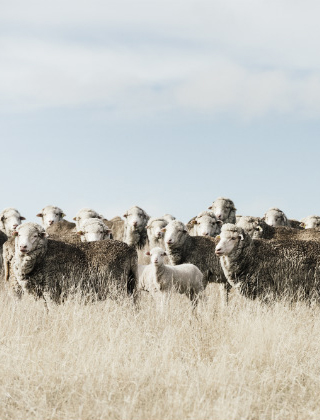Students gain insight into ram health

Murdoch University animal and vet science students were given a masterclass in improving ram breeding efficiency at a special RAMPing Up Repro workshop.
Animal Science student Kirsty Blakemore, Genstock veterinarian Dr Michylla Seal, veterinarian and researcher Dr Tom Clune, and veterinary science student Ben Madlener examine a ram at the RAMping Up Repro workshop held at Murdoch University
Murdoch University animal and vet science students were given a masterclass in improving ram breeding efficiency at a special RAMPing Up Repro workshop.
Rams are a considerable investment for a woolgrowers’ business; with the rams’ performance impacted by management and preparation for joining.
To help ensure that woolgrowers get the most from their rams, AWI in partnership with Zoetis Australia in 2017 developed the hands-on RAMping Up Repro workshop. The half-day workshop continues to be made available across the country, in conjunction with leading deliverers, via AWI’s State Grower Networks.
While the workshop is primarily aimed at producers already working on wool-growing properties, students at Murdoch University in Perth had the opportunity towards the end of last year to attend a specially organised workshop run for them at their on-campus veterinary farm.
The workshop was attended by 45 students who improved their knowledge in key areas relating to ram reproduction through hands-on activities and presentations from industry experts.
Participants learned how ram management influences breeding success, and the follow-on benefits of best practice ram management for wool and sheep meat businesses. Supporting topics including anatomy, physiology, nutrition, health management and biosecurity were also covered by the presenters to round out the students’ understanding.
INDUSTRY-SUPPORTED WORKSHOP
Presenter Dr Michylla Seal from Genstock, said they were pleased to support the workshop and it was great to work with so many students with great enthusiasm for the sheep industry.
“The main focus of these workshops is to give attendees the skills to assess and manage rams that ensure they perform like elite athletes for maximum breeding efficiency,” Dr Seal said.
“I was very impressed with the students’ involvement and discussions during the day. As a business owner providing services to sheep producers in artificial breeding and flock health, it is reassuring to have young people keen to enter the industry. We were thrilled to have the opportunity to support their training,” said Dr Seal.
Other speakers included Jarvis Polglaze from animal health company Zoetis who highlighted the importance of good vaccination techniques for sheep health and human safety.
Dr Tom Clune, who is currently undertaking a PhD research project at Murdoch, helped to demonstrate the breeding soundness inspection on rams.
PRACTICAL, HANDS-ON EXPERIENCE
First-year animal health and animal science student Kirsty Blakemore said the workshop helped her get to grips on the challenges of reproductive health in rams. “The workshop helped me get a glimpse into the world I want to be in, as livestock health is what I believe to be my passion,” she said.
Veterinary medicine student Ben Madlener said the workshop provided students with critical pre-joining examination skills and presented the critical managerial aspects of sheep reproduction.
“I hope to be able to apply this broad knowledge during my clinical placements in the following years through an understanding that there is no blanket rule for each farming business and that each requires its own best practice management plan,” he said.
Workshop organiser Associate Professor Caroline Jacobson said the session was a great opportunity for students to gain hands on experience and networking opportunities with industry.
“These industry workshops are a terrific way for our students to see howthey can apply the theoretical knowledge learnt throughout their studies to improve profitability of sheep enterprises,” Professor Jacobson said.
AWI Program Manager, Research and Extension, Emily King said the interest in the workshop was a promising sign for the future of the sheep and wool industry.
“It’s encouraging to see so much interest in the sheep and wool industry from students and we hope the RAMping Up Repro course provided not only a masterclass on ram health but an insight into how industry workshops are structured and delivered by experienced industry consultants, like Dr Seal,” she said.
The RAMping Up Repro workshops complement AWI’s Lifetime Ewe Management course, and Picking Performer Ewes and Winning With Weaners workshops – see www.wool.com/LTEM.
MORE INFORMATION
For more information on upcoming RAMping Up Repro workshops in your area, contact your AWI State Grower Network (contact details at www.wool.com/networks).
*** This workshop was held before the government’s COVID-19 social distancing guidelines were introduced. A recording of an online RAMping Up Repro webinar, held on 9 April, is available at https://www.sheepconnectnsw.com.au/tools/84/ ***
This article appeared in the March 2020 edition of AWI’s Beyond the Bale magazine. Reproduction of the article is encouraged, however prior permission must be obtained from the Editor.















